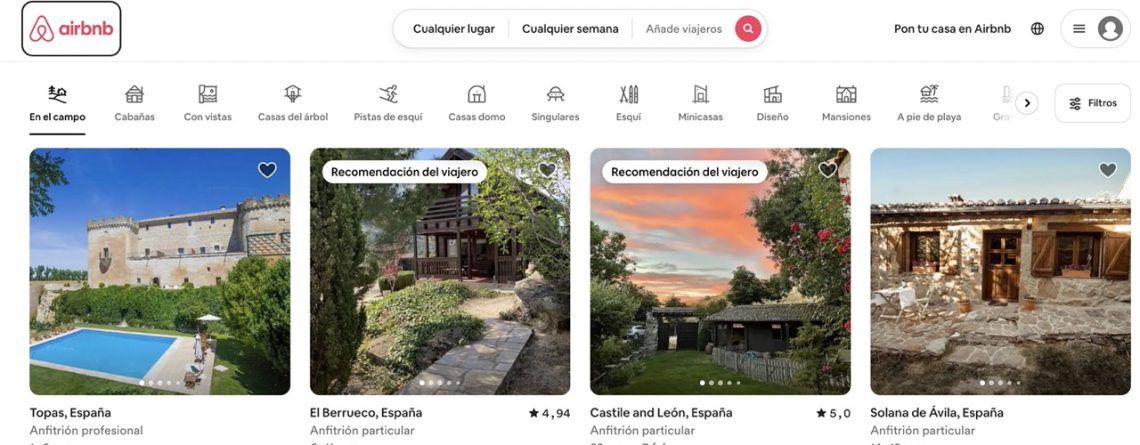Airbnb obliged to disclose the identity of owners
admin2024-01-10T04:58:50+00:00The tax authorities in Spain are once again tightening their grip on flat rental websites.
The platforms will be obliged to inform the Tax Agency of the identity of the owners of the flats and the income they receive from 26 June – The province has more than 50,000 registered tourist homes.
From 26th June, tourist rental platforms will once again be obliged to inform the Tax Agency of the identity of the owners of the flats they market and the income they receive. The Official State Gazette yesterday published the new declaration model that these operators will have to fill in, thus completing the process initiated by the Government to recover this obligation after the Supreme Court annulled the previous regulation approximately a year ago for not having communicated its approval to the European Commission.
The news was applauded yesterday by both the hotel employers’ association Hosbec and the Association of Tourist Apartments (Aptur), which have always denounced the exponential growth of irregular rentals and the unfair competition, in their opinion, that the arrival of these websites has brought. “It is the right thing to do, because the reactivation of tourism is not only going to benefit hotels, but also the entire parallel accommodation industry that has been created. And if it was necessary to fight the black economy before, it is even more so now. Everyone must pay their taxes,” says Hosbec’s general secretary, Nuria Montes, who recalls the enormous amounts of money that these platforms move.
Thus, according to studies carried out by this employers’ association using Big Data techniques, only the two main operators -Airbnb and Vrbo, the former Home Away- moved more than 41 million in rentals in the city of Alicante in 2019 -the figure was halved last year due to the pandemic- and another 29 million in Benidorm. Money that, without this declaration, has an easier time escaping tax authorities.
Miguel Ángel Sotillos, the president of the Association of Tourist Apartment Companies of the Costa Blanca (Aptur), was also in favour of this greater control, reminding us that, in reality, the new obligation affects all those who intermediate in a tourist rental, not just the platforms. “The fair thing is that everyone pays and that the Tax Agency controls everyone, not just the companies,” says Sotillos, who is confident that this time the system will be “less cumbersome” than the previous one, which was annulled by the supreme court.
In this sense, the president of Aptur recalls that on the Costa Blanca private rentals account for a large part of the supply of accommodation and that the regulations also require that all homes that are advertised on these websites are registered in the Register of Tourist Housing of the Generalitat. “The problem is that the platforms do not check the veracity of the registration number that is inserted”, regrets Sotillos.
Even so, the campaigns carried out by the regional government have allowed this register to collect data on more than 81,000 properties throughout the region, according to the president of Aptur, of which 65% – that is, more than 52,000 – are in the province of Alicante.
Foreigners
The business organisation believes that the Treasury’s decision to oblige the platforms to provide them with all the information will facilitate a greater volume of legal activity, although there are still loopholes. “There are cases, such as foreigners who market their properties on websites in their own countries, which are impossible to control,” says the business spokesperson.
After the annulment of the previous regulation in July last year, the government took advantage of the decree in which it approved the so-called “Tobin Tax” on financial transactions to introduce an article with which to recover this obligation, but it was pending approval of the declaration model. With its publication this Friday in the BOE (Official State Gazette), the measure will come into force on 26 June, so that it will already include transactions carried out this summer, when there is usually the most activity on this type of website. From that moment on, the platforms will have to report quarterly to the Tax Agency all the income they pay to the owners of the flats.
Taxation different from traditional renting
The taxation of the income obtained from tourist rentals is much higher than that payable for traditional rentals. In the latter, when it is a property that is rented out as a permanent residence, the owner has a 60% exemption, which is not enjoyed by tourist rentals. In addition, it should be borne in mind that if any additional services are offered in the flat, VAT must be paid.




